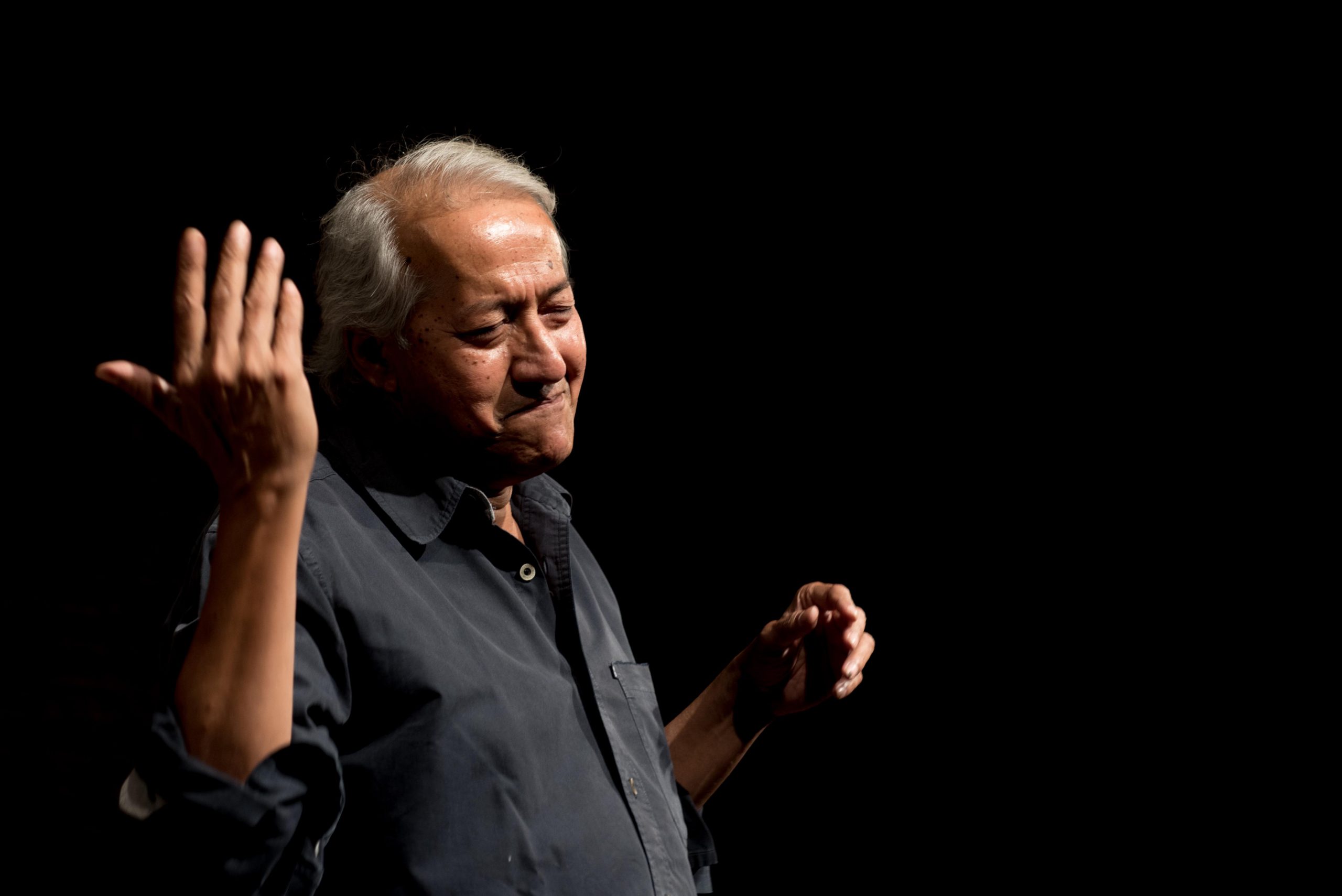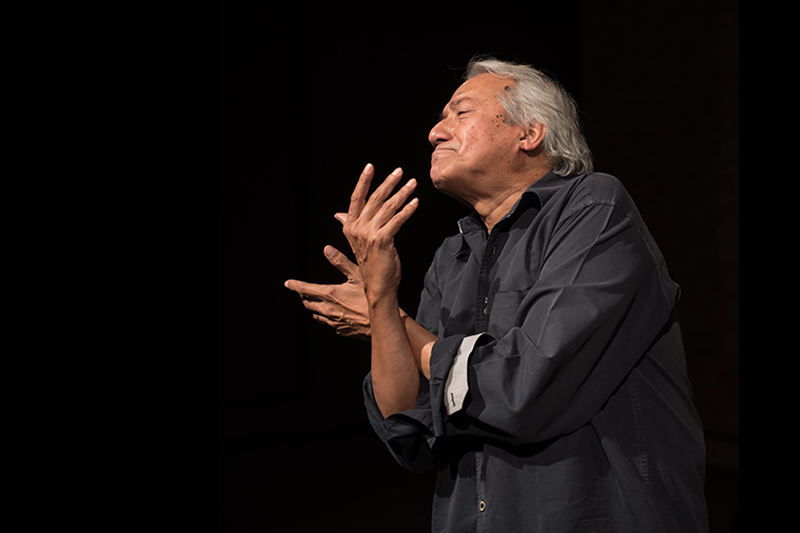
Actor, filmmaker, theatre director, and communications consultant, Avijit Dutt, dons many hats. With such films as The Second Best Exotic Marigold Hotel, No One Killed Jessica, and Jolly LLB to his credit as an actor, the Delhi-based gent maintains a steady passion for theatre, where he has played Ghalib, Banquo, and Rabindranath Tagore. In essaying a range of characters from the plays of Bertolt Brecht and Dario Fo, he uses his craft to voice social and political concerns. As he continues to enthrall both film and theatre with eloquence, and across multiple languages, we dive into the origins of his unique career, and the inseparability of art and politics.
You studied English Literature and Law, and then went on to teach briefly. How did acting come your way?
Acting preceded and still continues. I began acting in school. On graduating school and coming to Calcutta for college, I joined Red Curtain, a theatre group, and began writing plays and working with a gamut of directors and theatre groups. I also worked as a lighting designer and worked in jatra (Bengali folk theatre). Stealing time from the solicitor’s office or advertising agency was perfected as a juggling act that I became good at.
What element about a role or a project guides your decision in pursuing it? Once chosen, how do you prepare for that role?
Far too many elements, but it does have to do with the political climate and my inner state. Of course, it must offer new challenges for me to overcome. As a director, I try and read everything that could contribute to it, and then I reject the laid down paths to discover my own, for instance, for Peter Weiss’ Mockinpott (done as Muscat ka Maara Murari), I read a lot about the play, but abandoned all the scholarship, and decided to do it in a circus style with trapezes, tinny band, ring manager et al. For a role, I begin with a clean slate, approach it like the first role I’ve ever played, discover the voice of the character, then the movements, and so on.
In No One Killed Jessica, your character was based on the prominent lawyer, Ram Jethmalani, who is known for his involvement in controversial cases. How did you approach this role? Additionally, the debate regarding Jessica Lal verdict was at its peak when you were filming. How did you deal with it, and what did you think of trial by media, an idea that significantly influenced the case?
It had been suggested that I meet Mr. Jethmalani, but I banished the thought. My sense of truth had to be answered. I knew Manu (Sharma) was guilty but it was a question of my skill as a lawyer that would get him out. While we were shooting the film, he was convicted. As for a trial by media, this was one time I was really grateful that the Press took it up in the manner that they did.

Rehearsing his play The Unspeakable Truth; Image: Amit Mehra
A lot of your work is political or deals with social concerns, such as Akkar Bakkar. What is your take on the relationship between art and politics? Also, in the past you’ve stated, “The advantage of being in Delhi is that you can reject films that don’t work with your politics.” Could you elaborate on that?
Whether we understand it or not, every single act in society is a political act. Growing up in the 70s of Kolkata, we never distinguished between art and politics.
There are some films which are related to the director which do not turn me on. Maybe I do not understand popular culture – those I can conveniently reject sitting in Delhi. Being in Mumbai, I guess it becomes more complex as you are a part of the system and must give in to the totem pole arrangement. An actor dare not say he’s not interested in auditioning for a role or reject one; for soon word is put out that he has his nose in the air and may be rejected before he can!
As someone who is involved in advertising, in addition to acting, how do you juggle the two professions?
Advertising was a means to an end. I haven’t been active in ad agencies for over a decade. But the jugglery was and still continues to be more about time than anything else. The jugglery of integrity is a whole different issue. Working for CSR now for the last four years has resulted in a greater work-and-art balance.
What was it like to work with your daughter, Avalokita, in Jolly LLB 2?
In one word – delightful! But we are both uncompromising so there was bound to be a clash between what I felt the character should do and how was it in the entirety of the film.
How was the experience of working with such renowned industry persons as Vidya Balan, Akshay Kumar, and Rajinikanth?
Vidya is very complimentary of her co-actors, so it was wonderful for my ego! Akshay and I didn’t share much except for a scene. Mr. Rajnikanth was a different cuppa; he is genuine, warm, and as soon as we found common interests such as the Himalayas, we got talking.

Have you witnessed any significant shift in cinema and theatre since you started out? And what change would you like to see?
Theatre was not a stepping stone to other media, but now youngsters come to theatre with an eye to TV and, of course, films. But there’s a lot of good theatre happening, too, and established actors are coming back to the theatre to revive their skills and, I suspect, to have fun which no other media offers. Cinema has taken a turn for the better with content being the king. The earlier summation was that this is an ‘urban multiplex’ syndrome, but now the ‘sleeper hits’, without stars to prop them up, make it even in the single screen theatres.
I wish theatre could get more playwrights and resources. Wishful thinking!
What’s the best advice you’ve received regarding your career from your collaborators such as Badal Sircar or Habib Tanvir?
With Habib saab I had a charming association. Charandas Chor was just going to England and I enabled them with a drawn out light design which I used for a show in Kolkata. He was extremely warm and inspired me to do more in Hindi and Bengali theatre. Badal da was patient enough to go through my plays, gave pertinent suggestions, and gave me confidence. We also conducted a few theatre workshops together. Much of what I derived was more in the unsaid moments than in statements which I could, as a capsule, consume for instant growth.
You’ve worked in films, theatre, and television. Which medium is closest to your heart and why?
Theatre, for its here & nowness, and the fact that I’m more in control. To add to that, I can have childlike epiphanies, rejoice, and put them in the play!
As he moves on to his next act, we ask him to perform the signature DSSC Rapid Fire before we bid adieu.
A cinematic performance that has influenced you?
Marlon Brando in On the Waterfront.
A theatre performance that has influenced you?
Man is Man at the Berliner Ensemble.
Which is your most memorable performance till date?
I’m Not Sheikh Chilli.
Which is your favourite film?
Nayak by Satyajit Ray.
Which is your favourite city to perform in?
Still Kolkata.
A pro tip for aspiring actors?
Observe yourself and the world, and do voice work everyday.

